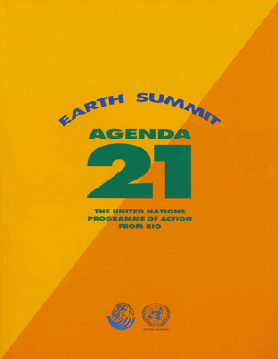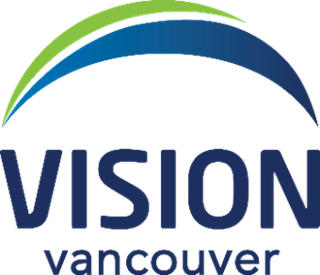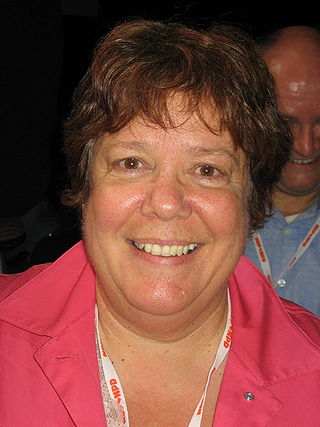
Agenda 21 is a non-binding action plan of the United Nations with regard to sustainable development. It is a product of the Earth Summit held in Rio de Janeiro, Brazil, in 1992. It is an action agenda for the UN, other multilateral organizations, and individual governments around the world that can be executed at local, national, and global levels. One major objective of the Agenda 21 initiative is that every local government should draw its own local Agenda 21. Its aim initially was to achieve global sustainable development by 2000, with the "21" in Agenda 21 referring to the original target of the 21st century.
The Coalition of Progressive Electors (COPE) is a municipal political party in the Canadian city of Vancouver, British Columbia. It has traditionally been associated with tenants, environmentalists, and the labour movement. COPE is generally guided by democratic socialist principles following the split of its social democratic wing in 2014 to form OneCity Vancouver, and has a long history of advocating for issues such as improving public transit and investing in affordable housing. It last held a majority government on city council from 2002 to 2005. COPE describes itself as being committed to renter protections, ending homelessness, taxing the rich to build social housing, safe supply, free transit, Indigenous reconciliation, climate action, and other social and environmental reforms.

Larry W. Campbell is a Canadian politician who was the 37th mayor of Vancouver, Canada, from 2002 until 2005, and a member of the Senate of Canada from 2005 until his retirement in 2023.

The Non-Partisan Association (NPA) is a municipal political party in Vancouver, British Columbia, Canada. It was established by the city's business leaders in 1937 to challenge the democratic socialist Co-operative Commonwealth Federation (CCF) in that year's municipal election. The party has historically been described as centre-right and drawn its strongest support from Vancouver's business community.

Harry Rankin was a Vancouver lawyer and long term member of the Vancouver City Council.
Raymond Louie is a Canadian politician. He is a five-term Vancouver City Councillor. Formerly a member of Coalition of Progressive Electors civic party, Louie broke away and was re-elected in 2005, and again in 2008, 2011, and 2014 as a member of Vision Vancouver.
Fred Bass is a former city councillor, environmentalist and a preventive medicine physician in Vancouver, British Columbia, Canada. As an epidemiologist and physician, he focused on reducing tobacco smoking. He served on Vancouver City Council from 1999 to 2005.

Jim Green was an American-Canadian who was a longshoreman, taxicab driver, community activist, non-profit housing developer, municipal politician, university instructor and development consultant.
Tim Louis is a lawyer and municipal politician in Vancouver, British Columbia, Canada. He was elected to the Vancouver Park Board in 1990 and 1993, and later to Vancouver City Council as a member of the Coalition of Progressive Electors (COPE) in 1999 and 2002.

Anne Roberts is a retired journalism instructor and former Vancouver city councillor. She was elected as a member of the winning majority of Coalition of Progressive Electors in 2002.

Vision Vancouver is a green liberal municipal political party in Vancouver, British Columbia, Canada. Vision was formed in the months leading up to the 2005 municipal election.
Heather Deal is a Canadian biologist and politician. She served as a Vancouver city councillor until 2018, first elected as a member of Vision Vancouver in 2005. She previously served as a Vancouver Park Board commissioner for the 2002 to 2005 term as a member of Coalition of Progressive Electors.

ICLEI – Local Governments for Sustainability is an international non-governmental organization that promotes sustainable development. ICLEI provides technical consulting to local governments to identify and meet sustainability objectives. It has a strong focus on biodiversity and has worked across local, national, and global levels. ICLEI was the first and is the largest transnational network of local governments engaging in climate action.
The Coalition of Progressive Electors (COPE) swept the 2002 Vancouver municipal election, winning 8 of 10 Council seats, 7 of 9 School Board seats and 5 of 7 Park Board seats. The Non-Partisan Association (NPA) was reduced to 2 Council seats, 1 School Board seat and 2 Park Board seats. The Green Party of Vancouver won 1 School Board seat.

The 2008 Vancouver municipal election was held on November 15, 2008, filling seats on the Vancouver School Board, the Park Board, the Vancouver City Council, and the position of Mayor of Vancouver. It was held at the same time as municipal elections throughout the province. Three major civic parties were represented: the Coalition of Progressive Electors, the Non-Partisan Association, and Vision Vancouver. The Green Party of Vancouver fielded one candidate for Park Board commissioner.

The City of Vancouver held a municipal election on November 19, 2011, along with other municipalities and regional districts in British Columbia. All local government elections were for a three-year period. The ballot elected one mayor, 10 councillors, nine school board trustees and seven park board commissioners. A $180 million capital borrowing plan was also put to a vote.
Gregory Bruce Yorke was a housing activist and city councillor in Vancouver, British Columbia, Canada.
The city of Vancouver, Canada, held municipal elections on November 17, 1990. Canadian citizens who were over 18 years of age at the time of the vote, and had been a resident of Vancouver for the previous 30 days and a resident of B.C. for the previous six months, were able to vote for candidates in four races that were presented on one ballot. In addition, Canadian citizen non-resident property owners were eligible to vote. For the first time, the City used Provincial Voters List as basis for City's List of Electors. 133,107 out of 257,352 voters cast ballots for a turnout of 52%.

The 1993 Vancouver municipal election was held on November 21, 1993, the same day as other municipalities and regional districts in British Columbia selected their new municipal governments. Voters elected a mayor, 10 city councillors, 7 park board commissioners, and 9 school board trustees through plurality-at-large voting.










